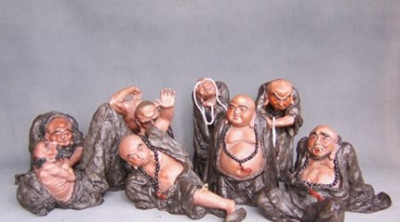(单词翻译:单击)
Liu Tingxun, as a very high-ranking official in that state, brought two ceramic bureaucrats with him into his tomb, presumably to take care of the everlasting admin. Oliver Moore has studied this elite bureaucratic class, which has become so synonymous with the Chinese state that we still refer to senior civil servants as mandarins:
高级官员刘廷荀用两个官员俑陪葬,想必是为了确保自己永世的行政权。奥利佛摩尔教授一直在研究精英官僚阶层,这个阶层逐渐成了中国政府的同义词,如今我们仍以“mandarin (官员)”一词指代高级公务人员。
"Administration was a bureaucratic operation. It combined very old aristocratic families with what we could call new men. They were divided into various ministries-public works, the economy, there was a military board-and then the largest of all, the one in which more officials were involved than in any other activity, was ritual, with something like between 30-50 per cent. And they would organise recurrent annual or monthly rituals, celebrations of the emperor's birthday, or princes'and princesses'birthdays, seasonal observances-things like the ploughing rite, where the emperor would open the agricultural season by symbolically ploughing a field somewhere in the palace.
当时的官僚系统由古老的侯门与我们可以称之为新贵的阶层共同构成,他们分属不同的部门,工部,户部,兵部以及规模最大的礼部。礼部官员会组织各种周期性的仪式(每年一次或每月一次),比方为皇帝、皇子和公主举办寿宴,以及农业节气,如演讲:每年春天,皇帝都会在宫内象征性地犁一下地,宣布春耕开始。
"There was a very small group, whose significance grew throughout the Dynasty, who took examinations and competed for state degrees. Later on, this system becomes magnified. So that by about the year 1000, you have something like 15,000 men coming to the capital to take exams, of whom only around 1,500 would get a degree. So this is a system in which the largest number, well over 90 per cent, will fail-repeatedly for the whole of their lives. And at the same time, this is a system which fosters loyalty to the Dynasty-which is quite remarkable really."
还有一类官员则通过科举考试获得官职。起初他们人数很少,但逐渐成了官僚系统的重要组成部分。科举考试的规模也逐年扩大,至公元一千年,有约一万五千人赴都城应考,其中一千五百人能够金榜题名,九成以上名落孙山,为数众多的人终其一生部在不懈赶考。这一科举制度同时也保证了官员对朝廷的忠诚度。



